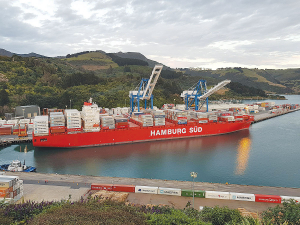Red Meat Sector Experiences Record Returns in 2025/26 Season
The red meat sector finds itself in "a very rare set of circumstances", says Federated Farmers meat and wool industry chair Richard Dawkins.
 NZ's primary product exports are facing clear downward pressure as economic conditions deteriorate offshore.
NZ's primary product exports are facing clear downward pressure as economic conditions deteriorate offshore.
Prices fetched by New Zealand's primary produce are facing clear downward pressure as economic conditions deteriorate offshore.
BNZ senior economist Doug Steel says the signs are looking more ominous.
However, he believes strong balance sheets, thanks to several years of strong commodity prices, should help farmers navigate a looming recession.
Steel points out that over the past six months global dairy prices have dropped 19%.
Offshore lamb and mutton product prices have fallen by varying amounts and as much as 27% while world beef price indicators are down 23%.
The news is also bad for the forestry sector: overseas log price indicators are off 26%.
“These are hefty falls, in short order, even if from generally strong starting points,” Steel adds.
In recent weeks, a firm bounce in the New Zealand dollar is causing more grief for commodity prices in local currency terms. Steel says the strengthening of the NZ dollar is a little unusual.
“Not in the sense that a rising NZ dollar is denting local prices, but rather that the NZD has lifted when many primary product prices offshore have been under downward pressure. Movements in global risk appetite appear to be a key reason for this."
Steel says the health of the world economy is of considerable importance to NZ’s primary sector.
“After all, it is the marketplace for the vast bulk of our primary produce.
“When the world is doing well economically, we see stronger demand for our primary products and prices tend to lift. In contrast, when the world struggles, we tend to see demand soften and prices dip.
“It has been with some trepidation, then, that we have continued to highlight the softening in the global economic outlook through this year. Global economic growth forecasts are still being progressively revised lower.”
Global recession is increasingly being talked about. Recession is expected in the US, UK, and EU, says Steel.
“Inverted yield curves – a situation where short-term interest rates are higher than longer-term interest rates – are a signal of recession ahead.”
He sees three main reasons why global economic growth is under pressure, namely: aggressive tightening in monetary policy from a large range of global central banks, as they fight high global inflation; weak activity in China as a result of Covid; and the economic fallout from the war in Ukraine including the considerable uncertainty it has created.
Steel adds that global recessions are usually not good for primary product prices.
“And this episode is shaping up as being no different. It is true that New Zealand’s exports have been solid – strong even – through 2022 to date.
“Indeed, in the calendar year through to October, goods exports were up a hefty 15.8% compared to the same period a year earlier.”
He also adds that NZ farmers have seen episodes like this before and no doubt they will see them again as the ebb and flow of commodity and financial cycles continue.
However, a positive this time around is that we head into a softer looking world economy following a period of previously low interest rates and generally strong primary product pricing (albeit with generally rising costs).
“This sees primary sector balance sheets generally looking stronger than they once did which will help navigation of any further global turbulence ahead.
“Of course, there are many moving parts. As always, we need to stay alert to changing market conditions and adjust plans, budgets, and forecasts as and when new information deems it necessary.”
Budou are being picked now in Bridge Pā, the most intense and exciting time of the year for the Greencollar team – and the harvest of the finest eating grapes is weeks earlier than expected.
The Real Estate Institute of New Zealand (REINZ) has released its latest rural property report, providing a detailed view of New Zealand’s rural real estate market for the 12 months ending December 2025.
Rural retailer Farmlands has released it's latest round of half-year results, labeling it as evidence that its five-year strategy is delivering on financial performance and better value for members.
OPINION: "We are back to where we were a year ago," according to a leading banking analyst in the UK, referring to US president Donald Trump's latest imposition of a global 10% tariff on all exports into the US.
DairyNZ says the Government’s proposed Resource Management Act reform needs further work to ensure it delivers on its intent.
Overseas Trade Minister Todd McClay says he's working constructively with the Labour Party in the hope they will endorse the free trade agreement (FTA) with India when the agreement comes before Parliament for ratification.

OPINION: A mate of yours truly reckons rural Manawatu families are the latest to suffer under what he calls the…
OPINION: If old Winston Peters thinks building trade relations with new nations, such as India, isn't a necessary investment in…